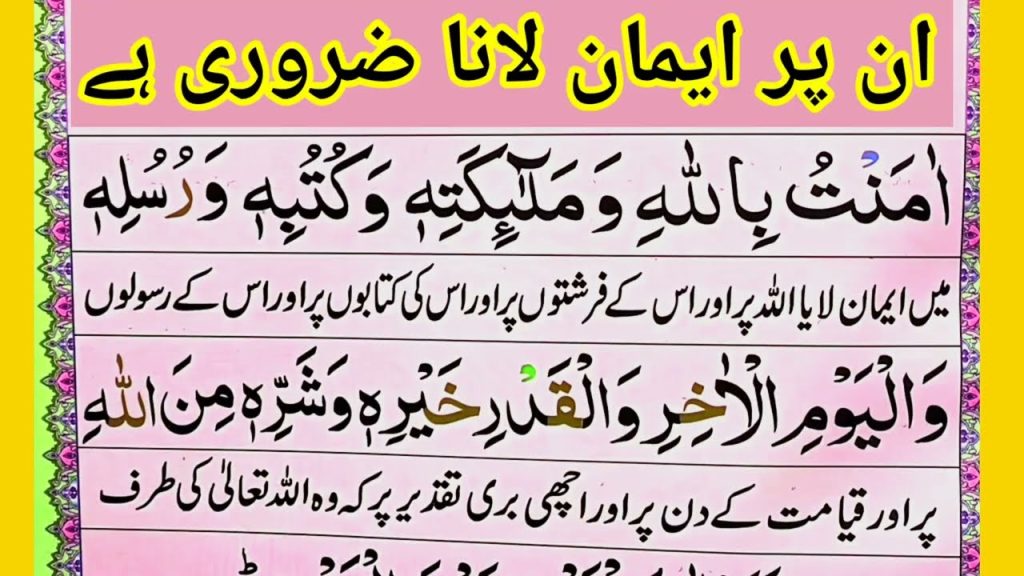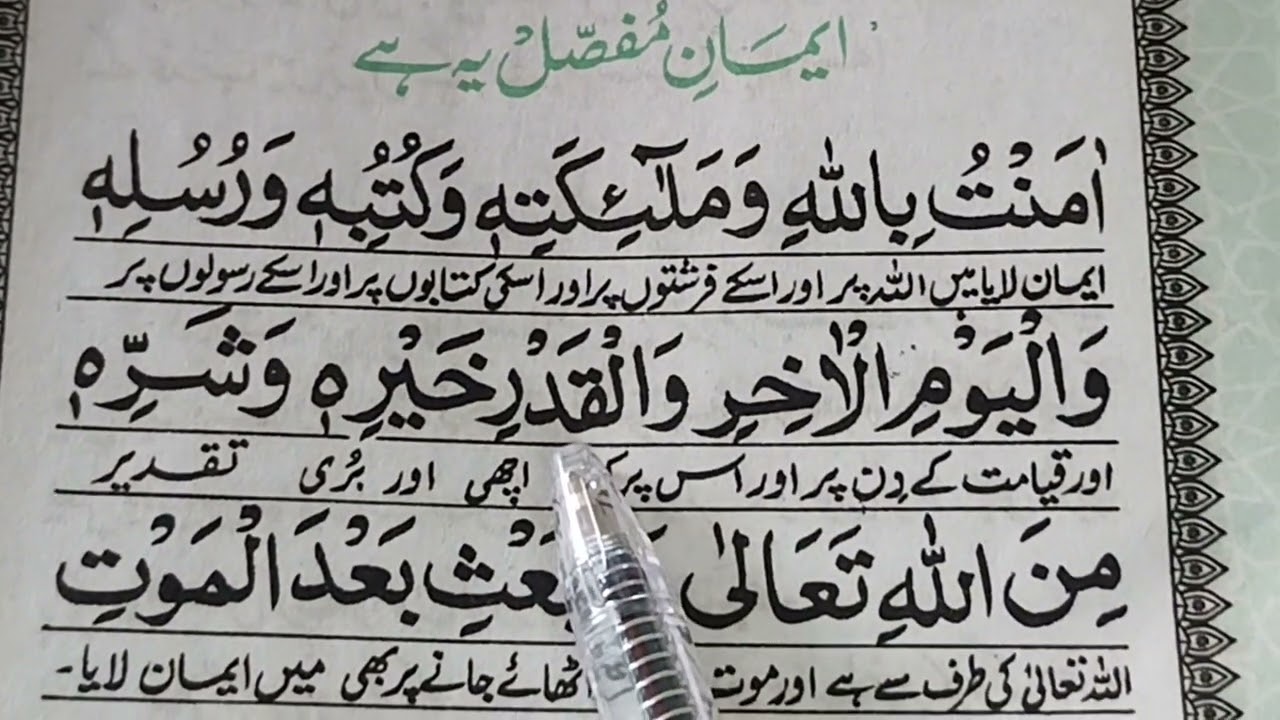Amantu Billahi Wa Malaikatihi in the Quran: Meaning, Significance, and Spiritual Significance
Introduction
In Islamic theology, the statement “Amantu Billahi Wa Malaikatihi” is one of the most important statements. It all comes down to having faith in Allah and His angels, which are central to the Islamic faith. This article explains its meaning, its location in the Quran, its theological significance, and its impact on daily spiritual life.
This verse serves more as a beacon of guidance that opens your heart to heavenly truth than it does as a dry statement that we learn in religion class. We will dissect its verses, examine similar verses in the Quran, and determine how it relates to belief and behavior in this conversation.

What does “Amantu Billahi Wa Malaikatihi” mean?
The sentence translates to:
“I totally believe in Allah and His angels.”
It’s one of a longer set of things we normally refer to as the Six Articles of Faith. The six articles are the fundamentals for any Muslim, and this sentence names two of the most fundamental ones:
- Belief in Allah (Tawheed—God’s Oneness)
- The Belief in the Angels (Malaikah)
This word comes up in nearly every Islamic textbook, statement of faith, and sermon. Although you will not see those words in a single verse, its components are extremely emphasized in the Quran.
Amantu Billahi Wa Malaikatihi Meaning:
“I believe in Allah and His Messenger.”
This is a concise declaration of faith and is often used in duas, daily affirmations, or when affirming belief.
The Six Pillars of Faith and This Declaration
“Amantu Billahi Wa Malaikatihi” forms part of the comprehensive Iman Mufassal, the detailed profession of faith, which includes
- Faith in Allah
- His angels
- His books
- His messengers
- The Last Day
- Qadar (Divine Decree)
This chapter is often the first thing children remember when they are trying to understand the pillars of Iman. It is Qur’an- and Hadith-based.
Amantu Billahi Wa Malaikatihi in Arabic (Full Statement):
آمَنتُ بِاللّٰهِ، وَمَلَائِكَتِهِ، وَكُتُبِهِ، وَرُسُلِهِ، وَالْيَوْمِ الْآخِرِ، وَالْقَدَرِ خَيْرِهِ وَشَرِّهِ مِنَ اللّٰهِ تَعَالٰى، وَالْبَعْثِ بَعْدَ الْمَوْتِ
Amantu Billahi Wa Malaikatihi in Urdu Translation:
میں ایمان لایا اللہ پر، اور اس کے فرشتوں پر، اور اس کی کتابوں پر، اور اس کے رسولوں پر، اور قیامت کے دن پر، اور تقدیر پر — چاہے وہ اچھی ہو یا بری — (یہ سب) اللہ تعالیٰ کی طرف سے ہے، اور موت کے بعد دوبارہ زندہ کیے جانے پر۔
Amantu Billahi Wa Malaikatihi in English Translation:
I believe in Allah, in His angels, in His books, in His messengers, in the Last Day, and in destiny — its good and its bad — from Allah the Exalted, and in resurrection after death.
Use:
This is part of the basic creed of a Muslim, often taught to children and recited in daily affirmations, duas, and Islamic studies.
Amantu billahi meaning In urdu
“آمَنتُ بِاللّٰهِ” کا اردو میں مطلب ہے:
“میں اللہ پر ایمان لایا۔”
لفظی ترجمہ:
- آمَنتُ = میں ایمان لایا
- بِاللّٰهِ = اللہ پر
یہ کلمہ ایمان کی سادہ لیکن جامع تعبیر ہے، جو ایک مسلمان کے عقیدے کی بنیاد کو ظاہر کرتا ہے۔
اگر آپ مکمل کلمہ — “آمَنتُ بِاللّٰهِ وَرَسُولِهِ” — کا ترجمہ چاہتے ہیں، تو وہ ہوگا:
“میں اللہ اور اس کے رسول پر ایمان لایا۔”
کیا آپ اس کا روزمرہ اذکار یا بچوں کے لیے آسان وضاحت بھی چاہتے ہیں؟
Quranic Verses That Illustrate This Belief
Even though you would not hear the words “Amantu Billahi Wa Malaikatihi” in one go, you would always find the Quran asking the believers to declare their faith in Allah and His angels. Have a look at the verses below:
Verse 285, Surah Al-Baqarah.
“The Messenger, like the believers, has complete faith in what his Lord revealed to him. They acknowledge the existence of Allah, His messengers, His scriptures, and His angels.
This verse effectively conveys the meaning of “Amantu Billahi Wa Malaikatihi.” Belief in Allah and His angels is the first of the core tenets of faith.
An-Nisa Surah (4:136)
“Hello, believers! Have faith in Allah, His Messenger, the Book He sent to His Messenger, and the earlier scriptures. A person is genuinely lost if they do not believe in Allah, His angels, His books, His messengers, and the Day of Resurrection.
This scripture affirms once further that the Islamic faith clearly believes in angels.
Why Believing in Allah is Number One
So, the whole sentence “Amantu Billahi Wa Malaikatihi” starts with believing in Allah, who’s our Sustainer and our Creator. Believing in Allah (Tawheed) is essentially the foundation for all the rest in theology. Honestly, nothing else in theology is important if you don’t believe in Allah.
Fascinating Facts of Allah in the Quran
- Ar-Rahman (The Most Merciful)
- Al-Aleem (The All-Knowing)
- Al-Khaliq (The Creator)
- Al-Hakeem (The Most Wise)
To believe in Allah is to believe in His names and attributes, how He governs all things, and how He communicates with us through messengers, books, and angels.
What Angels Are All About in Islam
The second half of the sentence pertains to belief in malaikatihi—His angels. They are not figurative; they are indeed entities created from light, and they have particular roles on this planet.
Main Functions of Angels in the Quran
- Jibreel (Gabriel): Imparts revelation to prophets.
- Mikail (Michael): Governs rain and nourishment.
- Israfeel will blow the trumpet to proclaim the day of judgment.
- Munkar and Nakir: Inspect souls in the grave.
- Kiraman Katibeen: Record everything in words and actions.
Angels help you become responsible and aware. Just knowing they are watching you makes you feel responsible and in the right.

How This Proclamation Affects Our Mental and Spiritual Health
- Promotes Taqwa (God-Consciousness) Belief in Allah and His angels makes words and actions more mindful.
2. Encourages Self-Discipline
The righteous feel the presence of God, and that keeps them away from sin and encourages virtues.
- Boosts Hope and Trust
Having faith in Allah’s direction and knowing that angels are always with you really makes you feel that you are never alone, even at your worst moments.
Is “Amantu Billahi Wa Malaikatihi” complete on its own?
This sentence is part of a greater statement, but not the entirety of Iman. Powerful as it is, it must be balanced by faith in the other five articles. But this brief sentence is a powerful reminder of two basic truths of Islam.
The majority of the believers believe it to be daily prayers, or duas, believing in the mercy of Allah and the plan of the world of the unseen.
Putting This Declaration into Practice in Your Daily Life
1. Morning or Evening Reminders
Start or end your day with a bit of reminder of faith.
2. Share It with Kids
This is a brief and memorable sentence, which is perfect for practicing Islamic studies at home.
3. Quote Quran Verses
Utilize this ayah and ayahs of Surah Al-Baqarah and Surah An-Nisa for a better understanding.
Frequent Questions
Hello, is the verse in the Quran just like it is written?
Not in a single verse, but its parts are constantly referred to in a few places.
Is the belief in angels obligatory in Islam?
Yes. Denial of their existence is a grave deviation from Islamic creed.
Can we use this word in prayer?
Although not a required part of Salah, it is recited in individual duas and during times of dhikr.
Conclusion
“Amaantu Billahi Wa Malaikatihi” is more than a phrase—it’s a proclamation of love, fidelity, and obedience to the Divine. It reminds the believer of the world unseen, of the One seeing all, and of the spiritual forces carrying out His will with fidelity and obedience. Through knowing its meaning and the Quranic basis, one is closer to religion, clear guidance, and a basis that will weather life.
“Amantu Billahi Wa Malaikatihi: Understanding Faith in the Quran
“Belief in Allah and Angels: Quranic Foundations Explained”

AoA, my name is Abd al-Rahman, and my vision is to spread the knowledge of the Quran to everyone. I am proud and tall while standing as your trusted mentor on the journey of learning and memorizing the Holy Quran. I, along with a committed team of Islamic teachers, am bound to provide an easy online facility for Islamic studies and Hifz programs.

